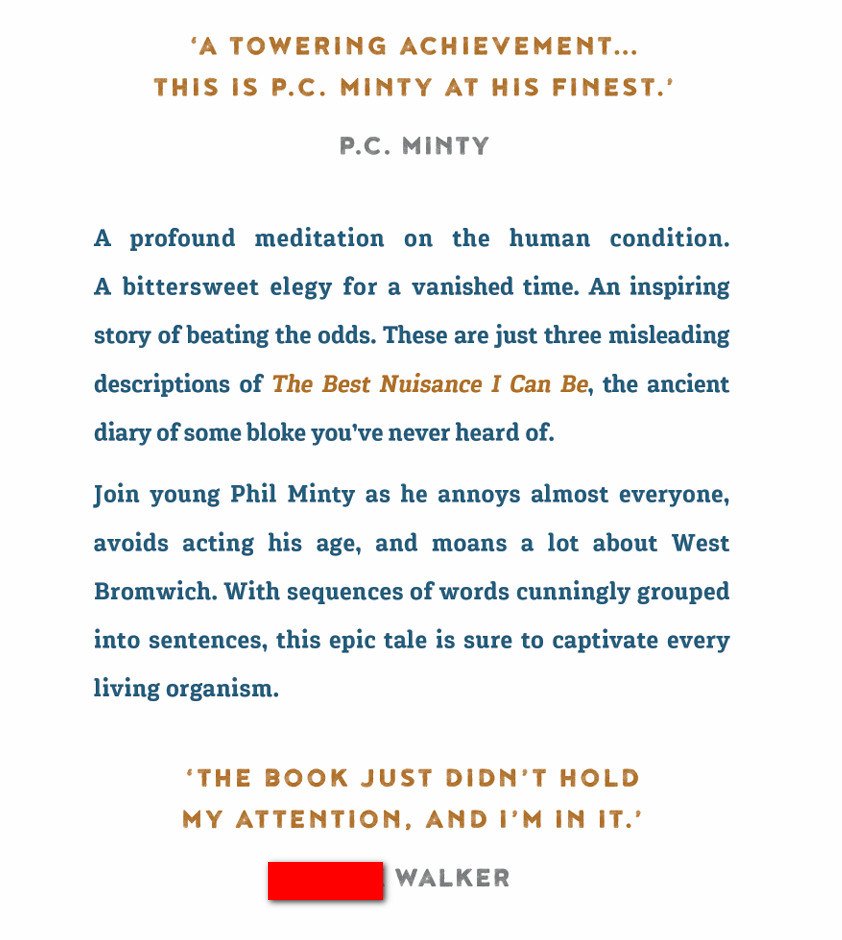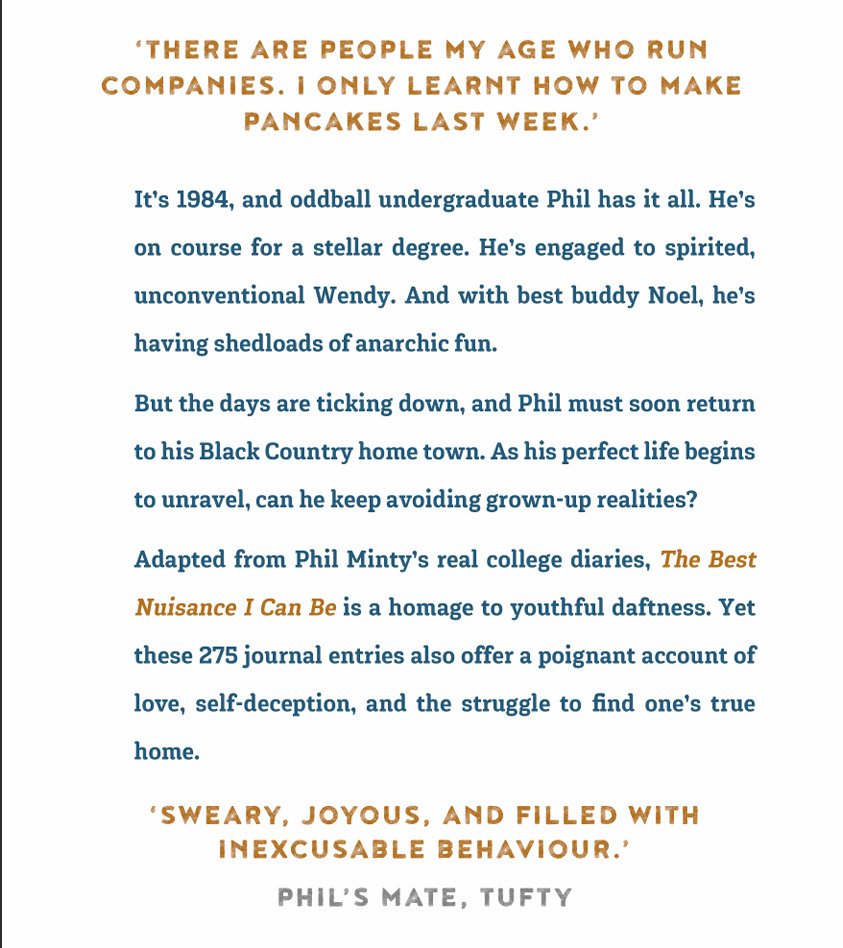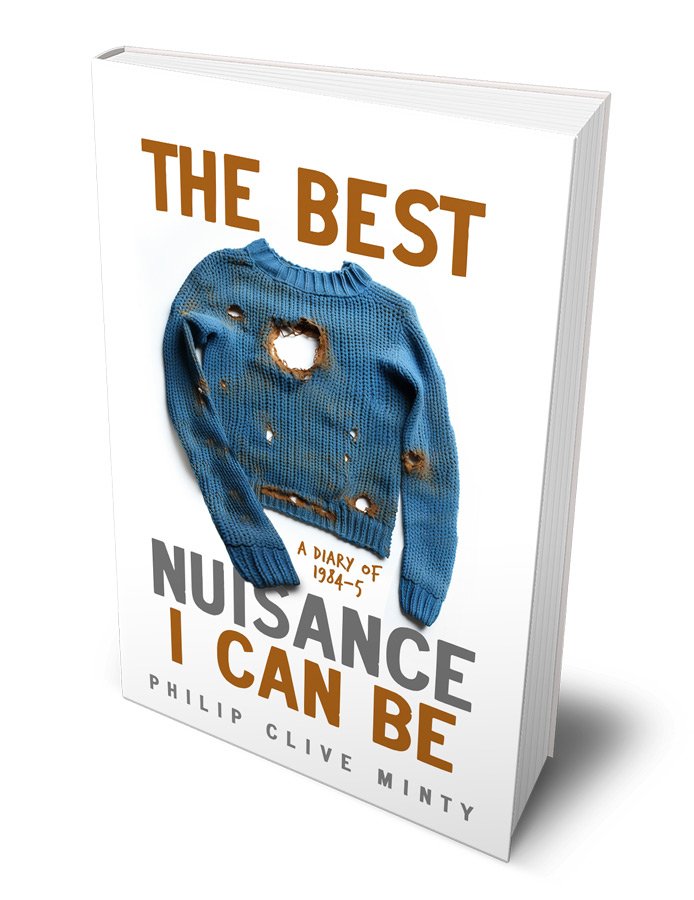Marketing challenge 2: the back-of-book blurb
This took forever and it’s still not right.
OK, I held my nose and jumped into this marketing lark. First stop was my back-of-the-book blurb. Is there a proper name for this? If so, I don’t know it.
Now, my first back-of-the book blurb was massive fun to write, and posed no ethical dilemmas. That’s because the book, The Best Nuisance I Can Be, was originally only given to friends. I uploaded a copy to Amazon KDP, printed off the copies I needed, then immediately ‘unpublished’ it so that it wasn’t publicly available. And that meant that the back-cover blurb could defy the usual rules:

See, now that’s my sort of thing. No lying or exaggeration required, because it’s a satire on overblown book blurbs. It’s intended as anti-marketing, a layer cake of manic approval and gloomy dissatisfaction. I particularly liked the idea that even someone who’s story was being told found it boring.
When I decided to ‘properly’ publish the book, I considered keeping the same blurb. But KDP (Amazon) stipulate that covers can’t make false claims about the contents, and the company is notorious for removing books that they think violate their policies. I have doubts whether the company, or at least its patrolling bots, understand irony.
Time to start over.
The Quote Problem
What if you ain’t got one?
A lot of back-of book blurbs begin with an endorsement from an enthusiastic reader/reviewer, followed by a bit of engaging promotional text. It’s the endorsements that have given me all the trouble.
The highest value quoted, I assume, are ones from celebrities, established critics, or publications. Within this, there’s presumably a sliding scale of value. One Claudia Winkelman might carry as much weight as, say, 109 Mr Motivators. He in turn is worth about 847 Anne Bainbridges. Anne Bainbridge, who I’ve just made up, represents a general reader whose name has no resonance with the public.
Unfortunately, I don’t have a Claudia Winkelman or a Mr Motivator. As things stand, I don’t even have an Anne Bainbridge. Even if I had the cajones to invent a Good Reads or Amazon reviewer, a moment’s googling would uncover my lie.
The absolute best I could do was get a quote from a mate. This is supposed to look funny, but I think the underlying message it broadcasts is that your book isn’t fit to be read by anyone other than your mates.
That’s a good start, then.
An ecstasy of dithering
Why not extract some gold from the text?
OK, so if I can’t legitimately quote anyone, could I use an extract from the text?
On the face of it, this is a fabulous solution. It gives me the design that I want, with a striking opening header (my adventures in book design may appear in a future post), it gives readers something to entice them in, and I don’t have to make anything up.
It turned out to be my first real sign of how biblically hopeless I am at marketing. Trying to pick a single extract unleashed an ecstasy of dithering. I spent fucking weeks going through the text trying to find the one telling sentence that:
- Didn’t occupy too much space
- Said something about the work as a whole
- Would work without surrounding context or background knowledge
- Was striking or notable in some way
- Wouldn’t put off lots of potential readers
After a lot of work, I found about 30 extracts. Then I tabulated them, assigned them scores on the five categories… and still couldn’t decide. I wasted days inserting one quote into the Photoshop back-page design, telling myself this was definitely the one, only to remove it a few hours later.
Seen on the page, each snippet worked well. Many of them made me chortle out loud. Yet as soon as they were plucked out of context, every single one seemed pedestrian, meaningless, unfunny, or some combination of these. Whatever I picked, I questioned whether anyone apart from me would ‘get it’.
Anyway, in the end, the dilemma was resolved because I had to choose something. Here’s what I went with:

In seventeen words, the pancake quote sums up something about my early twenties. I had deliberately rejected adult life, as much as I could, and starting a diary threw this choice into stark relief. Whereas people around me were growing up and starting to achieve things, I had nothing to write about – except my juvenile nonsense.
I hoped it might be, dare I say it, relatable. Surely I can’t have been the only twenty-something who felt like I was being left behind, that I was still settling myself in the starting blocks while others were halfway down the track?
I got some sort of answer when a friend handed a copy of the book to someone I’d just met. She read the opening quote out loud in a vaguely nonplussed monotone, then moved onto the next bit. It conveyed absolutely nothing to her.
Oh well. Maybe I can make up for it in the book description (that’s the next challenge!). Let me know in the comments what you think.

